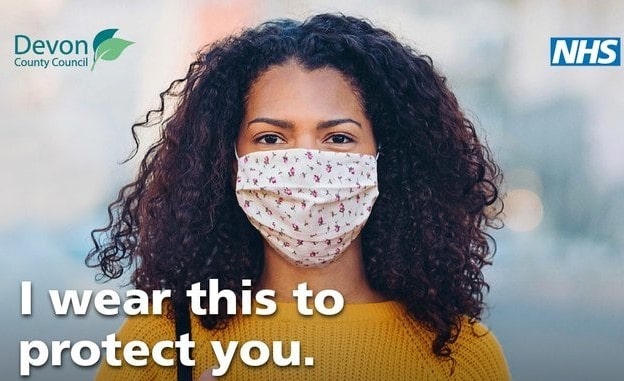What you need to know about face coverings

From Friday 24 July face coverings must be worn in shops, supermarkets, shopping centres and transport hubs.
You can buy them. You can make them. But it’s the law, so from now on you’ll need to wear something like a mask, scarf or bandanna that fully covers your nose and mouth in enclosed public spaces.
It’s important because the risk of transmission is so much higher indoors, so please let’s all do our bit. I wear a face covering to protect you. You wear a face covering to protect me. It’s simple. It helps fight spread of the virus, and besides, it enables further easing of national restrictions.
When using a face covering, the government strongly advises that you:
- make sure it covers your nose and mouth fully
- wash your hands or use hand sanitiser before putting it on or taking it off
- avoid touching the front of it or taking it off and putting it back on again a lot in quick succession
- wash it regularly and store it in a plastic bag in between washing or wearing
- avoid touching your eyes, nose, or mouth while wearing it
- not share your face covering with others.
There are some exemptions, so if you see anyone not wearing one, there may be good reason.
Face coverings are not mandatory for:
- Children under 11 years old
- People with disabilities or certain health conditions, such as respiratory or cognitive impairments that make it difficult for them to wear a face covering
- Children under 3 years old should not wear face coverings as they could cause choking or suffocation.
If you are exempt from wearing a face covering, you might feel more comfortable using an exemption card to show that you don’t have to wear one. You can download one to print or save to your smartphone from the government’s website. It’s up to you though, you don’t have to carry one and you shouldn’t be routinely asked to provide any written evidence of your exemption.
Remember, it’s the combination of these three measures that helps stop the spread of coronavirus:
- Keep your distance, as per social distancing
- Wash your hands regularly and thoroughly
- Wear a face covering, that fits over your nose and mouth
New police powers
The new measures will also see police given powers to issue a fixed penalty notice to anyone refusing to comply with the legislation, although Devon & Cornwall Police will be adopting an educate, engage and encourage approach with enforcement as a final option.
Assistant Chief Constable, Glen Mayhew, said:
“The Government has announced the change to COVID-19 legislation in order to further protect the public and those working in retail premises from being exposed to the pandemic.
We will be engaging and educating the public with enforcement as a final option. It is disappointing if my officers are having to give a £100 fixed penalty notice to any member of the public for refusing to comply with the legislation.
My hope is that everyone will be socially responsible and play their part in keeping our residents and many tourists in our region safe.”